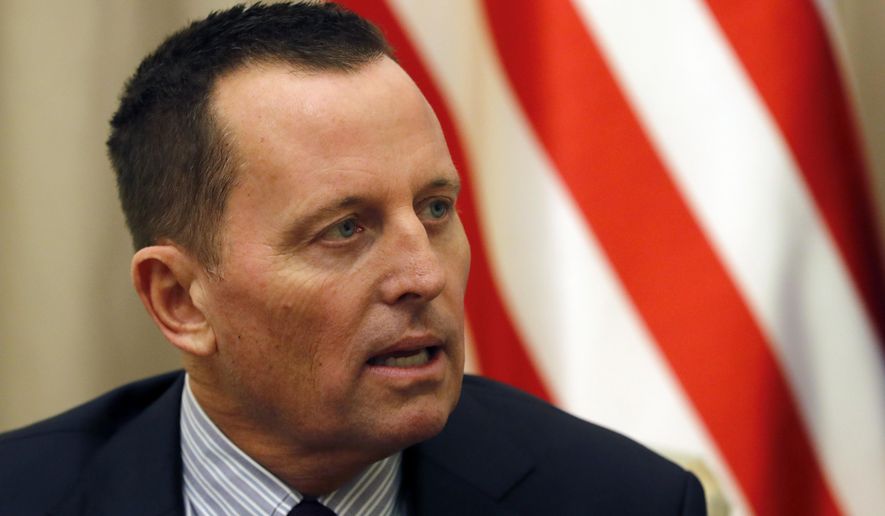Former acting chief of U.S. intelligence Richard Grenell this week launched a pointed defense of his short, but activist tenure, accusing one Democrat of repeatedly lying to America about President Trump and Russia collusion.
Mr. Grenell served three months as acting director of national intelligence. He declassified a number of documents while revamping headquarters staff. The documents included a list of Obama officials, including Vice President Joe Biden, who requested that the name of retired Army Lt. Gen. Michael Flynn be revealed, or unmasked, in secret intelligence reports they were reading.
He has also prepared for release the call transcripts of Flynn and Russian ambassador Sergey Kislyak––the evidence used by the FBI to gain a criminal conviction.
He also forced Rep. Adam Schiff, California Democrat, to released 2017-18 declassified witness transcripts from a House Russia probe. The documents show no Obama officials had evidence of Russia-Trump election conspiracy. Mr. Grenell said he would release them if Mr. Schiff, who chairs the House Permanent Select Committee on Intelligence, did not.
Mr. Grenell stepped aside with the swearing in of former Texas Rep. John Ratcliffe as DNI.
Mr. Grenell’s transparency campaign has irked Democrats, none more than Rep. Eric Swalwell, a member of the House Intelligence Committee which led the impeachment against Mr. Trump.
His unhappiness played out on Twitter.
“This is so comical,” Mr. Swalwell tweeted Thursday. “The Republicans led the Russia investigation, which ended in March 2018. They chose to not release the transcripts. What on earth are you talking about? I’m worried about you. Lay off the Trump Kool-Aid. You’ve had too much.”
Responded Mr. Grenell, “I’m talking about how you lied to the American people over and over again. You said publicly you saw lots of Russian collusion. But the many Republicans and Democrats you questioned under oath all said they saw NO COLLUSION. You knew what they said in private. You lied.”
Daniel Goldman, a committee impeachment counsel, also attacked Mr. Grenell.
“Sad to see that @richardgrenell has assumed the same kind of deceptive and deficient logic that @RepRatcliffe used during impeachment,” Mr. Goldman tweeted. “If any individual *fact* witness does not or cannot assert a *legal* conclusion, that does not mean that that legal conclusion cannot be found.”
Mr. Grenell answered, “I’m being deceptive?! I’m for transparency. You DC types hide the details from the American people and then go on TV and say something they can’t check. It’s the DC way. And it usually works - until Americans see the details (i.e. the hidden transcripts).”
Mr. Goldman is often cited by conservatives as the Trump critic who fully accepted allegations in the Christopher Steele dossier as late as December 2018. Two federal investigations in 2019 concluded the dossier was inaccurate. No claims against Trump aides was confirmed.
On Flynn’s intercepted calls in December 2016 when he served on the transition, Mr. Swalwell said, “Tick tock. Those are coming.” Well, you’re no longer director and the Flynn tapes never came. All you have to show for your work is the dirt on your boots from shoveling and burying evidence for @realDonaldTrump.”
“They are coming,” Mr. Grenell tweeted. “There’s a thoughtful process to transparency. For years you went on TV spreading the Russian propaganda - knowing the entire time that not one single person under oath from your committee saw any collusion. Not one. It’s shameful!”
Mr. Grenell made his transparency mark in other ways.
In April he declassified footnotes in the FBI wiretap abuse report by Justice Department Inspector General Michael Horowitz.
The new information was stunning: Intelligence services warned the FBI in early 2017 that the dossier on which the bureau relied heavily was likely Kremlin disinformation. The footnotes said that Russian intelligence knew of Mr. Steele’s project, financed by the Democratic Party and Hillary Clinton campaign, the moment he started collecting anti-Trump material in the summer 2016.
The FBI continued to use the dossier well into 2017 to obtain wiretaps on Trump campaign volunteer Carter Page and to guide the investigation into other Republicans.
• Rowan Scarborough can be reached at rscarborough@washingtontimes.com.




Please read our comment policy before commenting.